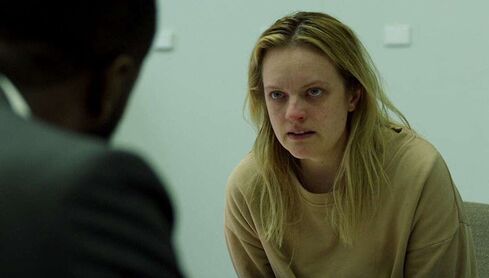 THIS is how you remake a Universal monster movie… …Back in 2014, Universal attempted to kick start its monster universe with Dracula Untold. And when that didn’t work, they tried again with the 2017 version of The Mummy, featuring Tom Cruise. Again, the attempt failed. But as they say, third time is the charm, and that can easily be said with the joint Universal and Blumhouse project, The Invisible Man. Written/directed by Leigh Whannell, The Invisible Man follows Cecilia (Elisabeth Moss), a tortured woman trapped in an abusive relationship, who decides to flee her husband, Adrian (Oliver Jackson-Cohen). Finally out of his grasp, he’s left her scarred. Afraid to go outside, even. But when it’s announced that the bastard has committed suicide, Cecilia finally finds herself getting her life back together. Until unexplainable occurrences begin to happen around the house. Events which have Cecilia feeling like she’s being watched. Adrian has come back to haunt her, not as a ghost, but something else. Gone is the over-the-top action of Dracula Untold. Gone is the bloated budget of Cruise’s The Mummy. And returning is the small-scale, creepy sense of atmospheric horror that these Universal monster movies should illicit. For the first time ever, Whannell takes us away from the invisible man himself as our lead character, and puts us directly in the shoes of the person experiencing the torment which he causes. This film is a timely commentary on abuse and male domination, and Whannell plunges the audience into that theme right away with a heart-attack inducing, daring escape by Cecilia. We watch as she wakes up in the middle of the night and peels Adrian’s drugged hand away from her body with a hint of disgust and uncontrollable fear. The next few minutes are a nail-biting endeavor in suspense as nearly every piece of noisy bad luck nearly brings Cecilia’s carefully crafted plan crashing down, until she is finally out and climbing over a wall surrounding the house. Like a mad king with a castle and a moat, Adrian hasn’t built this wall to keep trespassers out. He’s built it to keep Cecilia in, with him. In a time where Harvey Weinstein has just been convicted and the #MeToo movement is stronger than ever, The Invisible Man could not be releasing into a world more ready for its story. This theme of control is what makes The Invisible Man so completely chilling. Like many women who have been trapped in a relationship such as Cecilia’s, no one believes Cecilia when she describes her torment, or they write her off as exaggerating and making it all up. She has been left so broken and drained of life by Adrian, that every cry for help seems like madness to others. And part of the brilliance here is that Whannell even puts us in the seat of the doubters, occasionally forcing us to wonder, IS this all in Cecilia’s mind? How COULD Adrian still be alive and torturing her as an invisible entity, when we’ve seen photos and police reports of his death? The Invisible Man is a hard-hitting film, and a lot of that is thanks to Moss’ devastating combination of fear, loneliness, and a will to survive. The moment she is told Adrian is dead, Moss simultaneously conveys overwhelming joy and a terror that it can’t be true, with just the slightest expression of the eyes. This is by far Moss best performance on screen. She is the true star here, not the invisible man. We care deeply about Cecilia, but we also grow to love the people around her. Between Cecilia’s cop friend, James (Aldis Hodge), his daughter, Sydney (Storm Reid), and Cecilia’s sister, Alice (Harriet Dyer), Whannell has crafted a variety of honest to god good people who are doing everything they can to help Cecilia break through her trauma (minus Adrian’s slimy brother, Tom, played by Michael Dorman), and so it hurts that much more when Cecilia is framed, again and again, by the invisible force which is destroying her newfound life and turning those she loves against her. Fitting in with the abusive relationship theme, it’s all about taking from Cecilia, and leaving her feeling desperate, crazy, and terribly alone. Like any horror film, it all starts small. Burning food left on the stove. Tugging the sheets off of Cecilia in the middle of the night. All of it done with a slow, precise pace where the camera holds on scenery until you’re frantically investigating every frame, looking for any hint of the invisible man, which is often paid off, for those looking closely. With The Invisible Man, Whannell has mastered the ability to create suspense, while allowing the audience to scream out all of that tension with a few great shocks. Over and over, The Invisible Man packs an unseen sucker-punch that knocks the air right out of the room. When the first kill comes, it comes swiftly and brutally, and my god, does it HURT. Every time the invisible man strikes, the audience is made to feel the pain through sound effects that shake the spine, and nifty camerawork that expands on Whannell’s gifted sense of choreography, particularly during one sequence in a hospital that leaves a trail of broken, bloody bodies. It’s only a small taste of what was on display in Upgrade, but it’s pure, satisfying carnage. Composer Benjamin Wallfisch’s score also brilliantly enhances the tension, filling scenes with a near unbearable dread, never sounding like music, but more like the slow, eerie drums of hell. And for those who think you saw everything in the trailer, sorry, but you didn’t. Whannell doesn’t do a spectacular job of hiding the film’s many secrets, but this is the invisible man like you’ve never seen him before. This story isn’t just thematically timely, but a modern update on Universal’s monster that is all the more frightening because of just how close to being a reality it really is. H.G. Wells was praised for his early concept of a time machine, and the filmmakers deserve praise for their reinvention of the invisible man. The film isn’t without its not-so-invisible blotches, though. Logical flaws like how no one sees the invisible man whipping a knife around in a very public place requires some ultra-stretchy elastic of the imagination, and the answers to the mystery, while mostly satisfying, leave some pretty big loose-ends that it’s obvious the filmmakers were hoping the audience wouldn’t see. But I see you, plot holes! Despite that, The Invisible Man is a tense pulse-pounder that intelligently updates the invisible man for a modern world, with heavy ideas that explore traumas that largely go unseen, while presenting a character in Cecilia that has the power to encourage others to face their own tragedies. The villain may be invisible, but my content smile leaving the theater was clear as day. Don’t let this one go unseen. The Invisible Man opens in theaters on February 28th through Universal and Blumhouse. By Matt Konopka
0 Comments
Leave a Reply. |
Archives
March 2023
|


 RSS Feed
RSS Feed